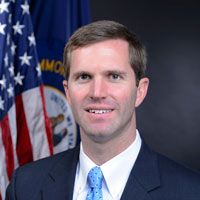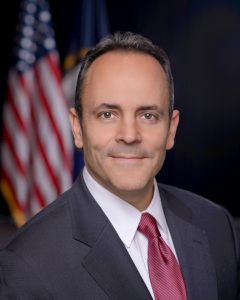 Councilman Rick Blackwell invites residents to the next District 12 Dialogue on Tuesday, May 16th to learn more about the Metro Council’s Budget Review for the coming fiscal year. MSD also will make a presentation about its 20-year Critical Repair and Reinvestment Plan.
Councilman Rick Blackwell invites residents to the next District 12 Dialogue on Tuesday, May 16th to learn more about the Metro Council’s Budget Review for the coming fiscal year. MSD also will make a presentation about its 20-year Critical Repair and Reinvestment Plan.
“The Council is just beginning its review of the Mayor’s proposed 2017 -2018 Capital and Operating Budgets,” says Blackwell. “The budget review process is one of the most important responsibilities of the Metro Council and it also gives a thorough understanding of how all of the Metro agencies and departments work together.”
Representatives of MSD will also be on hand to give a presentation of their plan to repair and replace important infrastructure over the next two decades.
MSD’s 20-year Critical Repair and Reinvestment Plan covers critical risks in six areas:
- Ohio River flood protection system
- Stormwater drainage and inland flooding
- Viaducts
- Crumbling sewer infrastructure
- Wastewater treatment facilities
- Consent decree and support systems
The next District 12 Dialogue will be held at 6:00 pm at the Southwest Government Center Courtroom, 7219 Dixie Highway.
There will also be representatives from LMPD and Codes and Regulations to help constituents address specific concerns or problems.
For more information about the May District 12 Dialogue, contact Councilman Blackwell’s office at 574-1112.
 Councilman Bill Hollander invites D9 constituents to participate in a discussion about the upcoming budget. The Metro Council has started the review of the 2017-2018 budget recommended by Mayor Greg Fischer. The proposed budget focuses heavily on public safety, including significant investments in LMPD, while continuing to fund affordable housing, paving and a new Northeast Regional Library.
Councilman Bill Hollander invites D9 constituents to participate in a discussion about the upcoming budget. The Metro Council has started the review of the 2017-2018 budget recommended by Mayor Greg Fischer. The proposed budget focuses heavily on public safety, including significant investments in LMPD, while continuing to fund affordable housing, paving and a new Northeast Regional Library.
The May District 9 Community Conversation is set for Wednesday, May 17, at 6:30 p.m. at the Peterson Dumesnil House, 301S. Peterson Avenue.
The $593 million general fund operating budget anticipates $23 million in new revenue, with the greatest chunk of that – $19 million, or 83 percent – earmarked for LMPD and the Office for Safe and Healthy Neighborhoods, including additional police officers.
The budget proposal was presented one month earlier than usual under an ordinance Hollander sponsored last year. The ordinance was designed to give the public and Council members more time to evaluate and comment on the budget.
“As with all D9 Community Conversations, discussion of any other subjects is welcome and I will be available to talk with constituents about any questions, comments or concerns,” says Hollander. “So, mark your calendar and bring along a friend or neighbor to let me know what you think.”
For more information about May’s D9 Community Conversation, contact Councilman Hollander’s office at 574-1109.
 For the second time in as many months, Attorney General Andy Beshear is releasing information to the public on the work of his office after a request for information by Gov. Matt Bevin.
For the second time in as many months, Attorney General Andy Beshear is releasing information to the public on the work of his office after a request for information by Gov. Matt Bevin.
Beshear is releasing information on his Office of Civil and Environmental Law’s Administrative Hearings Branch after a March 10 letter by the governor.
Last month, Bevin requested information on the AG’s Office of Civil and Environmental Law’s Open Records/Open Meetings Branch and information on the office’s civil attorneys and caseload.
Beshear released that information to the public Feb. 10.
“As I have repeatedly said, each time the governor requests information it gives me the chance to honor the hard work of the employees in my office,” Beshear said. “While many Kentuckians are unfamiliar with this branch in the Attorney General’s office, it plays a vital role to ensure government is operating properly and within the guidelines of the law.”
Hearing officers serve as impartial adjudicators of administrative matters in government. Lawmakers established the branch in 1994 to conduct administrative hearings for government boards and agencies and provide training in administrative hearing procedures for hearing officers, who propose or render decisions on claims regarding government programs.
Currently, the branch provides hearing officer services to more than 60 government agencies and boards across Kentucky.
“Use of the branch is advantageous, as the hearing officers are independent, unlike those employed by the same agency or cabinet who often bring action in a matter or has made a decision that initiated the matter,” Beshear said. “Using an independent hearing officer can defeat claims of having ‘kangaroo courts’ in administrative matters involving an agency or cabinet.”
The branch recently conducted a training March 15 at the Kentucky Transportation Cabinet, providing three hours of continuing legal education and educational requirements as required by Kentucky law.
“Our team has spent more than 175 hours responding to the eight different requests from the governor for information on my office,” Beshear said. “This is valuable time that should have been spent furthering our missions of seeking justice for victims of sexual assault, protecting seniors from scams, addressing our drug problem and protecting children from sexual abuse.”
 On Monday, Gov. Matt Bevin restored the right to vote and hold public office to certain offenders who have completed their respective sentences and have applied for restoration of their civil rights.
On Monday, Gov. Matt Bevin restored the right to vote and hold public office to certain offenders who have completed their respective sentences and have applied for restoration of their civil rights.
The orders exclude individuals convicted of violent or sex crimes, bribery or treason.
“We have always been a nation of second chances,” said Gov. Bevin. “The criminal justice system should not exist solely to punish offenders, but also to rehabilitate and assimilate them back into society. Through this executive action, we are empowering men and women with the opportunity to become contributing members of our communities. Restoring the voting rights of certain low-level offenders is a significant step towards achieving this goal. There will be many more such opportunities granted in the months and years ahead.”
While the orders restore the right to vote and hold public office, they do not restore any other civil right, including but not limited to the right to receive, possess or transport in commerce a firearm or serve on a jury.
The Bevin Administration has initiated groundbreaking criminal justice reform efforts aimed at removing barriers for offenders to successfully reenter society.
In 2016, Gov. Bevin signed into law historic felony expungement legislation that gives non-violent felony offenders who have paid their debt to society a second chance. House Bill 40 allows Kentuckians convicted of certain Class D felonies—who have paid their debt to society, have stayed out of trouble as required by the law, and have shown that they are indeed trying to get back on track—to erase their criminal records and obtain a second chance at jobs, housing, and other opportunities sometimes denied felons.
Also, this past February, Gov. Bevin issued an executive order that removes questions about criminal history from the initial application for state jobs in the executive branch. The Fair Chance Employment Initiative means that applicants will not be required to check the box for criminal convictions on the initial state application, a policy in line with twenty-four states and more than 150 cities and counties across the nation.
Individuals who are interested in applying for restoration of their civil rights may do so by obtaining a form at any Probation and Parole office, or by contacting the Department of Corrections at 502-782-2248 or online at corrections.ky.gov, and returning the form to the address listed.

Twitter/@realDonaldTrump
President Donald Trump visited Louisville this evening for a rally in Freedom Hall. The arena was filled to capacity with supporters holding “Women For Trump,” “Promises Made, Promises Kept,” and “Buy American, Hire American” signs as well as the omnipresent “Make America Great Again” caps while a long line of people stood outside hoping to be let in.
Not everyone in attendance was a supporter, however, as there was a scattering of several protesters outside of the event.
During the event, President Trump hit on all of his usual talking points including terrorism, imigration, tax reform, crime and drugs, trade agreements, and the Second Amendment.
He covered the repeal and replacement of the Affordable Care Act (ACA) in depth, while making multiple references to US Congressmen Andy Barr and James Comer (both from Kentucky) for their help and a reference to the efforts of US Senator Rand Paul in making sure the replacement is not just “Obamacare lite”. He pointed out that as many one third of the counties in the entire US are limited to only one health insurance provider because of the regulations that the ACA put into place, causing health insurance companies to pull out of many markets.
He went on to outline that the real issue is not just the cost of health insurance, but the cost of health care and medicines. Trump tied in tax reform with this repeal and replacement, stating that the administration cannot accomplish tax reform until they know how the new health law will be structured. The President was very optimistic with the replacement plan that is coming forth and is confident that a plan that will make everyone happy will be on his desk at the end of the day.
Near and dear to many Kentucky workers, Trump also specifically mentioned the automobile manufacturing and coal industries. He recently signed a bill that eliminated a piece of regulation that many supporters of the repeal believe was put into place to shrink the coal industry by requiring coal mines to spend millions on compliance costs. More than 600 coal mines have closed since the 2009 regulation went into effect. Since the rule has been revoked, many coal mines have slightly increased their labor force, but POTUS Trump promised that this is just the beginning.
No Trump event would be complete without Trump’s trademark jabs at the “fake news” and former political rival Hilary Clinton. The President even made light of the Louisville Cardinals men’s basketball team’s second-round elimination from the 2017 NCAA basketball tournament. He did continue on to say, “They are a great team, great coach.”
According to Kentucky’s The Family Foundation, nearly half the money contributed last year to a political action committee that opposed Republican candidates in state legislative races came from teacher’s PACS and teachers’ union PACs that oppose school choice and charter schools, and more than two-thirds of the contributions came from out-of-state.
Kentucky Family Values received $3,300,769 in the Fall 2016 general election, $1,375,000 that came from teachers’ PACs. And, of that $3,300,769, $2,216,279 came from out of state.
“Kentucky Family Values spent its money supporting Democrats and opposing Republicans in state legislative races,” said Martin Cothran spokesman for the group. “These are groups that represent the educational status quo in this state who are now asking the very people whose election they opposed to give credence to their arguments against parental choice.”
In the two months immediately prior to the Fall 2014 general election, Kentucky Family Values received $1,617,575, over half of which was from out-of-state entities and $650,000 of which was contributed by teachers’ groups.
Gov. Matt Bevin has joined with 25 other states in filing an amicus brief in Peruta v. San Diego County, an important Second Amendment case challenging the constitutionality of a California law restricting citizens’ rights to carry handguns outside their homes for self-defense.
 “As states and individuals, we must stand united against arbitrary government overreach and this unconstitutional attack on the Second Amendment,” said Gov. Bevin. “In America, our freedom and liberty have been purchased at a great price. We must do everything in our power to preserve them for the generations yet to come.”
“As states and individuals, we must stand united against arbitrary government overreach and this unconstitutional attack on the Second Amendment,” said Gov. Bevin. “In America, our freedom and liberty have been purchased at a great price. We must do everything in our power to preserve them for the generations yet to come.”
The case questions the legality of California’s restrictive concealed carry permit policy, which requires citizens to satisfy a number of conditions before obtaining a concealed carry license. Under the law, an applicant must show “good cause” to obtain a permit, and each county sheriff gets to create their own subjective definition of “good cause.”
Also included in the amicus brief are Alabama, Alaska, Arizona, Arkansas, Florida, Georgia, Idaho, Indiana, Kansas, Louisiana, Michigan, Missouri, Montana, Nebraska, Nevada, North Dakota, Ohio, Oklahoma, South Carolina, South Dakota, Texas, Utah, West Virginia, Wisconsin and Wyoming.
“When it comes to regulating gun rights, California thinks that the State can do things that would be unthinkable in other areas of constitutional law,” the brief noted, challenging the Court to envision the public outcry if other constitutionally protected rights were subjected to the same capricious judgement of a public official.
“Imagine if California did any of the following: no speech unless a sheriff finds ‘good cause’ for it; no public assembly unless a sheriff finds ‘good cause’ for it; no religious exercise unless a sheriff finds ‘good cause’ for it,” the 26 states assert.
 Weather
Weather Traffic
Traffic @LouisvilleDispatch
@LouisvilleDispatch @LouisvilleDisp
@LouisvilleDisp Subscribe
Subscribe